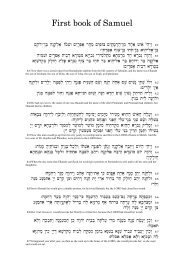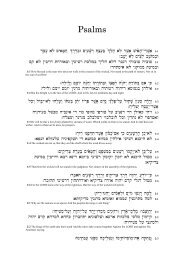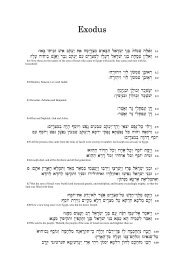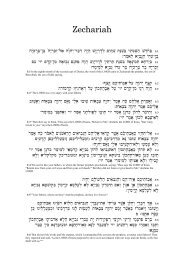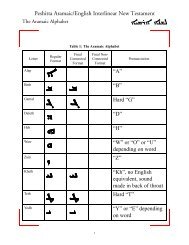Split Words - Peshitta Aramaic/English Interlinear New Testament
Split Words - Peshitta Aramaic/English Interlinear New Testament
Split Words - Peshitta Aramaic/English Interlinear New Testament
You also want an ePaper? Increase the reach of your titles
YUMPU automatically turns print PDFs into web optimized ePapers that Google loves.
Versions that say since or a variation thereof: None that I am aware of. Only one of the major Greek manuscripts<br />
seems to have this reading, so it is not a surprise to find that it is not represented among the <strong>English</strong> versions.<br />
Now, it just so happens that the <strong>Aramaic</strong> word dk can be translated as ‘because’, ‘when’ and ‘since’.<br />
“Another "problem" word in <strong>Aramaic</strong> which has many meanings is the word dk (please see Lexicon, word#<br />
9808.) This word can mean "When, After, While, Where, Since, etc."<br />
If the various Greek manuscripts of Yukhanan's Gospel were translation from the <strong>Aramaic</strong> version of Yukhanan,<br />
we would expect that they would vary in their exact translation of this word, and in fact they do.<br />
The following Greek manuscripts translate it "Because": p66 p75 S A B L X Theta Psi f1 33<br />
The following translate it "When": D, K, Delta, Pi, f13, 565, 700, 892, 1241<br />
And the following manuscript translates it "Since": W<br />
How could Yukhanan have written this in Greek? Doesn't the mere fact that these variances exist mean that the<br />
Greek manuscripts are only translations?” – Paul Younan<br />
Acknowledgements: Thanks to Paul Younan for providing this split word.<br />
14. Beginning or firstfruits? – 2Thessalonians 2:13<br />
The KJV says: “But we are bound to give thanks alway to God for you, brethren beloved of the Lord, because God<br />
hath from the beginning chosen you to salvation through sanctification of the Spirit and belief of the truth:”<br />
The ISV says: “Now at all times we are obligated to thank God for you, brothers who are loved by the Lord,<br />
because God chose you to be the first fruits for salvation through sanctification by the Spirit and through faith in<br />
the truth.”<br />
Versions that say beginning or a variation thereof: ALT, ASV, DARBY, Geneva, GodsWord, Holman, KJ21, KJV,<br />
LITV, MKJV, NASB, NIV, NIV-UK, NKJV, Rotherham, RSV, WE, Webster, Weymouth, YLT.<br />
Versions that say firstfruits or a variation thereof: AMP, ESV, ISV, Wycliffe.<br />
Now, it just so happens that the <strong>Aramaic</strong> word 'reshitha', in the <strong>Peshitta</strong>, can mean ‘beginning’ and ‘firstfruits’,<br />
pointing to an <strong>Aramaic</strong> original to the Greek manuscripts.<br />
“In the <strong>Peshitta</strong> text of 2nd Thes. 2:13 you'll find the word 'reshitha' which has several meanings, but the two I<br />
want to focus on are 'beginning' and 'firstfruits.' The Greek variants prove an <strong>Aramaic</strong> original because some Greek<br />
manuscripts have a word that means 'beginning' and some others have a word that means 'firstfruits.' Nestle-Aland<br />
26th has 'aparchen' defined as follows:<br />
(1) to offer firstlings or firstfruits<br />
(2) to take away the firstfruits of the productions of the earth which was offered to God. The first portion of the<br />
dough, from which sacred loaves were to be prepared. Hence term used of persons consecrated to God for all time.<br />
(3) persons superior in excellence to others of the same class



